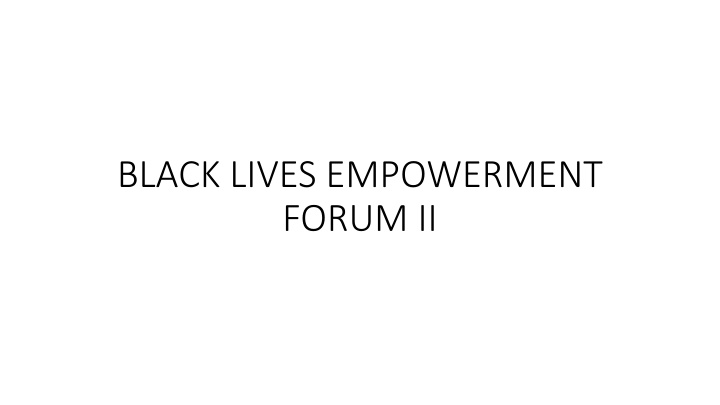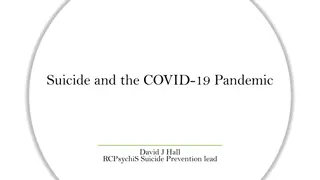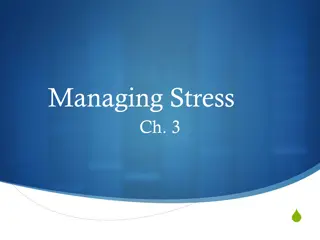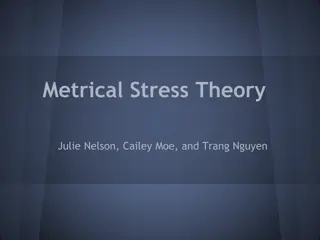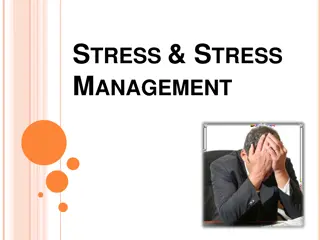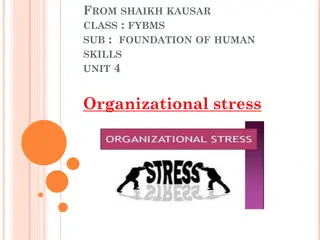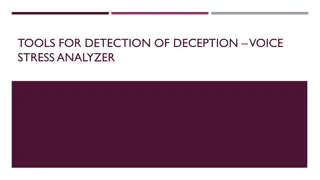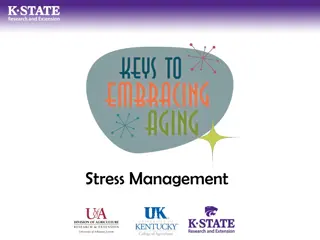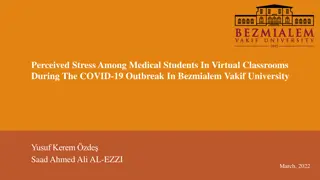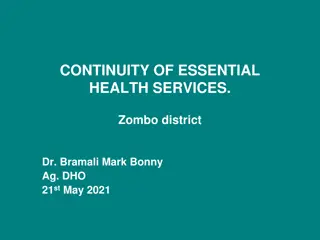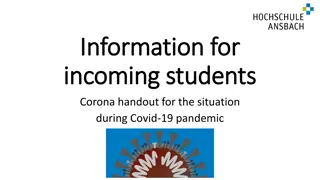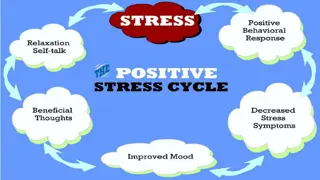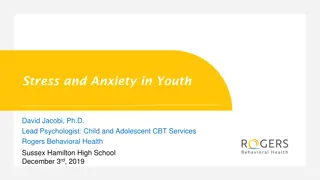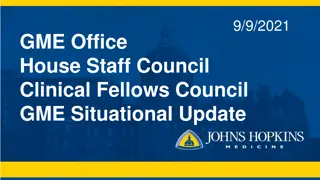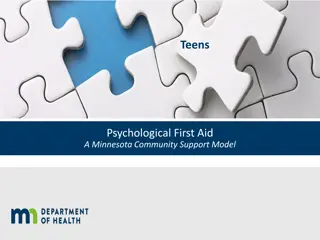Stress during COVID-19 Pandemic
Stress during an infectious disease outbreak like the COVID-19 pandemic can lead to fear, worry, changes in sleeping and eating patterns, and worsened mental and physical health conditions. How individuals respond to this stress depends on various factors such as background, social support, financial situation, and community. Certain groups, including frontline workers, individuals with existing mental health conditions, and those experiencing social isolation, may be more strongly impacted.
Download Presentation

Please find below an Image/Link to download the presentation.
The content on the website is provided AS IS for your information and personal use only. It may not be sold, licensed, or shared on other websites without obtaining consent from the author.If you encounter any issues during the download, it is possible that the publisher has removed the file from their server.
You are allowed to download the files provided on this website for personal or commercial use, subject to the condition that they are used lawfully. All files are the property of their respective owners.
The content on the website is provided AS IS for your information and personal use only. It may not be sold, licensed, or shared on other websites without obtaining consent from the author.
E N D
Presentation Transcript
BLACK LIVES EMPOWERMENT FORUM II
Coronavirus Pandemic 2020, A Moving Target DR. RANDY W. HAWKINS
MENTAL HEALTH NEEDS DR. THEMA BRYANT-DAVIS
The coronavirus disease 2019 (COVID-19) pandemic may be stressful for people. Fear and anxiety about a new disease and what could happen can be overwhelming and cause strong emotions in adults and children. Public health actions, such as social distancing, can make people feel isolated and lonely and can increase stress and anxiety. However, these actions are necessary to reduce the spread of COVID-19. Coping with stress in a healthy way will make you, the people you care about, and your community stronger.
Stress during an infectious disease outbreak can sometimes cause the following: Fear and worry about your own health and the health of your loved ones, your financial situation or job, or loss of support services you rely on. Changes in sleep or eating patterns. Difficulty sleeping or concentrating. Worsening of chronic health problems. Worsening of mental health conditions. Increased use of tobacco, and/or alcohol and other substances.
How you respond to stress during the COVID-19 pandemic can depend on your background, your social support from family or friends, your financial situation, your health and emotional background, the community you live in, and many other factors. The changes that can happen because of the COVID-19 pandemic and the ways we try to contain the spread of the virus can affect anyone.
People who may respond more strongly to the stress of a crisis include: People who are at higher risk for severe illness from COVID-19 Children and teens. People caring for family members or loved ones. Frontline workers such as health care providers and first responders, Essential workers who work in the food industry. People who have existing mental health conditions. People who use substances or have a substance use disorder. People who have lost their jobs, work hours reduced, or had major changes to their employment. People who have disabilities or developmental delay. People who are socially isolated from others People in some racial and ethnic minority groups. People who do not have access to information in their primary language. People experiencing homelessness. People who live in congregate (group) settings.
Taking care of your friends and your family can be a stress reliever, but it should be balanced with care for yourself. Helping others cope with their stress, such as by providing social support, can also make your community stronger. During times of increased social distancing, people can still maintain social connections and care for their mental health. Phone calls or video chats can help you and your loved ones feel socially connected, less lonely, or isolated.
Know what to do if you are sick and are concerned about COVID-19. Know where and how to get treatment and other support services and resources, including counseling or therapy. Take care of your emotional health. Take breaks from watching, reading, or listening to news stories, including those on social media. Take care of your body. Take deep breaths, stretch, or meditate Try to eat healthy, well-balanced meals. Exercise regularly. Get plenty of sleep. Avoid excessive alcohol and drug use. Make time to unwind. Try to do some other activities you enjoy. Connect with others. Talk with people you trust about your concerns and how you are feeling. Connect with your community- or faith-based organizations.
Knowing the facts about COVID-19 and stopping the spread of rumors can help reduce stress and stigma. Understanding the risk to yourself and people you care about can help you connect with others and make an outbreak less stressful.
Mental health is an important part of overall health and wellbeing. It affects how we think, feel, and act. It may also affect how we handle stress, relate to others, and make choices during an emergency.
People with pre-existing mental health conditions or substance use disorders may be particularly vulnerable in an emergency. Mental health conditions (such as depression, anxiety, bipolar disorder, or schizophrenia) affect a person s thinking, feeling, mood or behavior in a way that influences their ability to relate to others and function each day. These conditions may be situational (short-term) or long-lasting (chronic). People with preexisting mental health conditions should continue with their treatment and be aware of new or worsening symptoms. If you think you have new or worse symptoms, call your healthcare provider.
Call your healthcare provider if stress gets in the way of your daily activities for several days in a row. Free and confidential resources can also help you or a loved one connect with a skilled, trained counselor in your area. PLEASE SEE FAME WEBSITE FOR THE LIST OF IMMEDIATE CRISIS CONTACTS
SUICIDE Different life experiences affect a person s risk for suicide. For example, suicide risk is higher among people who have experienced violence, including child abuse, bullying, or sexual violence. Feelings of isolation, depression, anxiety, and other emotional or financial stresses are known to raise the risk for suicide. People may be more likely to experience these feelings during a crisis like a pandemic.
However, there are ways to protect against suicidal thoughts and behaviors. For example, support from family and community, or feeling connected, and having access to in- person or virtual counseling or therapy can help with suicidal thoughts and behavior, particularly during a crisis like the COVID-19 pandemic.
Emotional reactions from recovering from COVID-19/Ending Home Isolation may include: Mixed emotions, including relief. Fear and worry about your own health and the health of your loved ones. Stress from the experience of having COVID-19 and monitoring yourself, or being monitored by others. Sadness, anger, or frustration because friends or loved ones have fears of getting the disease from you, even though you are cleared to be around others. Guilt about not being able to perform normal work or parenting duties while you had COVID-19. Worry about getting re-infected or sick again even though you ve already had COVID- 19. Children may also feel upset or have other strong emotions if they, or someone they know, has COVID-19, even if they are now better and able to be around others again.
Disparities Affecting the Black Communities Anthony Mack
There is increasing evidence that some racial and ethnic minority groups are being disproportionately affected by COVID-19. Inequities in the social determinants of health, such as poverty and healthcare access, affecting these groups are interrelated and influence a wide range of health and quality-of-life outcomes and risks. To achieve health equity, barriers must be removed so that everyone has a fair opportunity to be as healthy as possible.
Some of the many inequities in social determinants of health that put racial and ethnic minority groups at increased risk of getting sick and dying from COVID-19 include: Discrimination Healthcare access and utilization Occupation Educational, income, and wealth gaps Housing
These factors and others are associated with more COVID-19 cases, hospitalizations, and deaths in areas where racial and ethnic minority groups live, learn, work, play, and worship. They have also contributed to higher rates of some medical conditions that increase one s risk of severe illness from COVID-19. In addition, community strategies to slow the spread of COVID-19 may cause unintentional harm, such as lost wages, reduced access to services, and increased stress, for some racial and ethnic minority groups.
What We Can Do The COVID-19 pandemic may change some of the ways we connect and support each other. As individuals and communities respond to COVID-19 recommendations and circumstances, there are often unintended negative impacts on emotional well-being such as loss of social connectedness and support. Shared faith, family, and cultural bonds are common sources of social support. Finding ways to maintain support and connection, even when physically apart, can empower and encourage individuals and communities to protect themselves, care for those who become sick, keep kids healthy, and better cope with stress. Community- and faith-based organizations, employers, healthcare systems and providers, public health agencies, policy makers, and others all have a part in helping to promote fair access to health. To prevent the spread of COVID-19, we must work together to ensure that people have resources to maintain and manage their physical and mental health, including easy access to information, affordable testing, and medical and mental health care. We need programs and practices that fit the communities where racial and minority groups live, learn, work, play, and worship.
